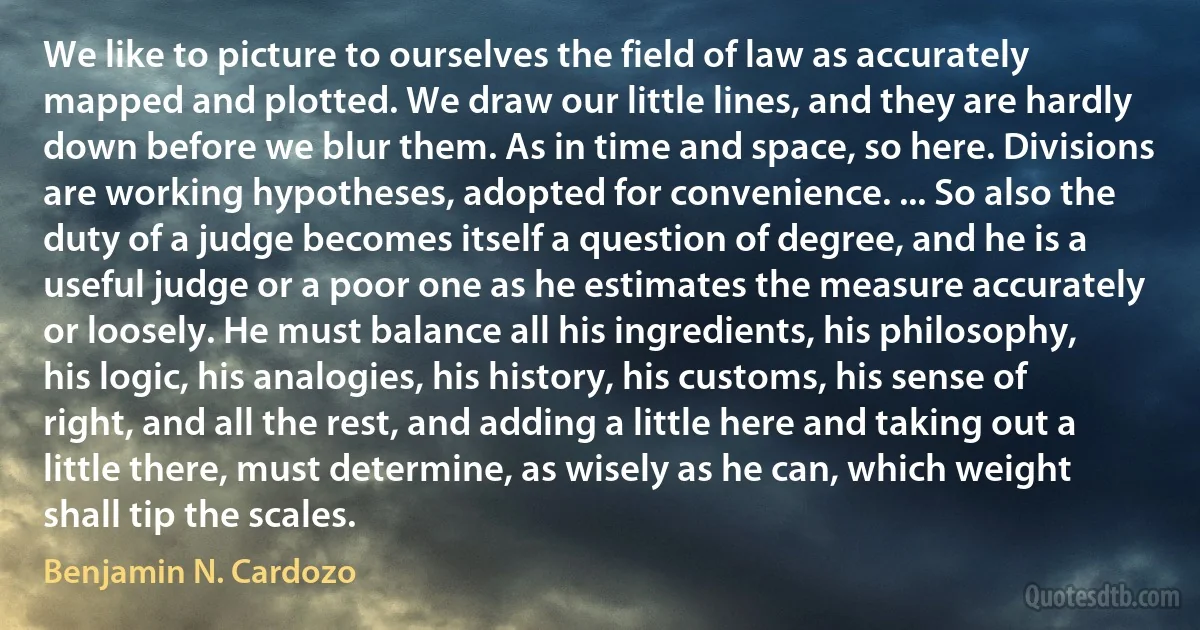
We like to picture to ourselves the field of law as accurately mapped and plotted. We draw our little lines, and they are hardly down before we blur them. As in time and space, so here. Divisions are working hypotheses, adopted for convenience. ... So also the duty of a judge becomes itself a question of degree, and he is a useful judge or a poor one as he estimates the measure accurately or loosely. He must balance all his ingredients, his philosophy, his logic, his analogies, his history, his customs, his sense of right, and all the rest, and adding a little here and taking out a little there, must determine, as wisely as he can, which weight shall tip the scales.
Benjamin N. CardozoRelated topics
blur degree draw duty field history hypothesis judge law measure picture poor question rest right sense space taking time tip weight working customs divisionsRelated quotes
And he waves the pages of the papers, black and white the way space was when the galaxies were being formed, and crammed-as space was then-with isolated corpuscles, surrounded by emptiness, containing no destination or meaning. And I think how beautiful it was then, through that void, to draw lines and parabolas, pick out the precise point, the intersection between space and time where the event would spring forth, undeniable in the prominence of its glow; whereas now events come flowing down without interruption, like cement being poured, one column next to the other, one within the other, separated by black and incongruous headlines....

Italo Calvino
As I was a stranger to all the lower country, I thought it absolutely necessary for me to come for ward. A thorough knowledge of the country is not easily obtained; such a one, at least, as is necessary to fix upon the most eligible position for forming a camp. The security of the army, the ease and convenience of the troops, as well as to perform the du ties of my office with a degree of reputation, all conspired to make me wish to fix upon the properest ground for the purpose. This it was impossible for me to do, unless I came on before the troops. And I must confess I saw no objection, as your Excellency had wrote me nothing to the contrary, and what I wrote naturally led to such a measure.

Nathanael Greene
This implication of the Mathematical Universe Hypothesis is pretty radical, so please pause your reading for a moment to take it in and think about it. What you're aware of right at this moment feels not like a photo but like a movie clip. This movie isn't reality-it exists only in your head, as part of your brain's reality model. It contains lots of information about the actual external physical reality-as long as you aren't dreaming or hallucinating-but still constitutes only a very heavily edited version of reality, akin to the evening news on TV, mainly featuring certain highlights of patterns nearby in space and time that your brain thinks are useful for you to be aware of.

Max Tegmark
Like all walls it was ambiguous, two-faced. What was inside it and what was outside it depended upon which side of it you were on. Looked at from one side, the wall enclosed a barren sixty-acre field called the Port of Anarres. [...] It was in fact a quarantine. The wall shut in not only the landing field but also the ships that came down out of space, and the men that came on the ships, and the worlds they came from, and the rest of the universe. It enclosed the universe, leaving Anarres outside, free. Looked at from the other side, the wall enclosed Anarres: the whole planet was inside it, a great prison camp, cut off from other worlds and other men, in quarantine.

Ursula K. Le Guin
As the glossaries lengthen, as the footnotes become more elementary and didactic, the poem, the epic, the drama, move out of balance on the actual page. As even the more rudimentary of mythological, religious or historical references, which form the grammar of Western literature, have to be elucidated, the lines of Spenser, of Pope, of Shelley or of Sweeney Among the Nightingales, blur away from immediacy. Where it is necessary to annotate every proper name and classical allusion in the dialogue between Jessica and Lorenzo in the garden at Belmont, or in Iachimo's stealthy rhetoric when he emerges in Imogen's bedchamber, these marvellous spontaneities of enacted feeling become "literary" and twice-removed.

George Steiner
